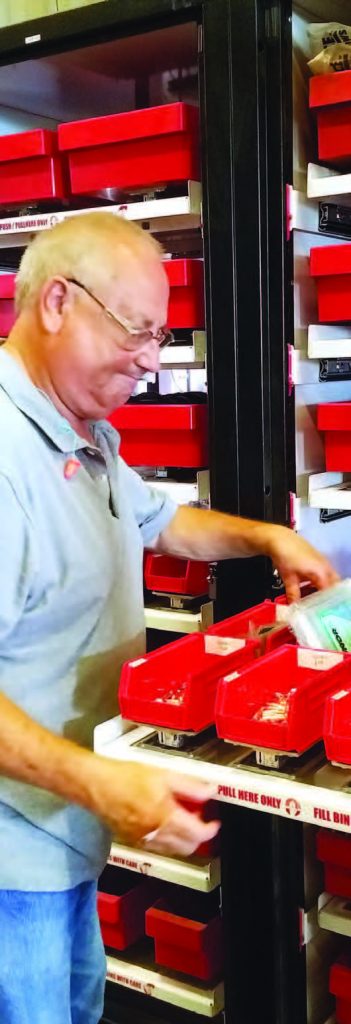
Asked to explain the value of his two-year-old electronic supply cabinets, the comparison Joe Greving reaches for is to a major technological shift.
“I can’t imagine going back to the way we used to do it,” said Greving, president of Iowa Steel Fabrication in Osceola. “Once you have an iPhone X for 30 days, you’re not going back to a flip phone.”
Greving’s “iPhones” in this metaphor are two large, industrial vending machines that dispense not sodas and snacks but welding sticks, safety glasses, and other items that Iowa Steel’s 70 employees need during the normal course of carrying out their jobs.
Two years ago, at the suggestion of Airgas, Iowa Steel’s main source for such supplies, the company stopped using its employees to handle and sort such items. Now the machines submit their own orders electronically to Airgas—while simultaneously giving the company detailed information about which of its employees is using what.
Ron Burmester, branch manager for Airgas’ central Iowa region, said such machines are used by nine of his office’s customers. The technology is not yet taking over. But it has proven incredibly popular with companies able to use the new data to control costs.
“Typically, it’s a larger customer that takes it,” Burmester said. “It depends on what the customers need.”
At Iowa Steel, Greving believes the machines have saved time and boosted productivity. Sensors inside the machine automatically detect what’s taken out, giving Airgas a precise list of what needs restocking via the trucks that visit Iowa Steel each Friday.
“Employees are difficult to come by,” Greving said. “If you can limit the amount of time your key employees are off task, stocking shelves, or looking for supplies, those are things that are immeasurable.”
Although the technology is not cutting edge, it appears to be growing.
Mike McGillis, art director at Wittern Group, a Clive-based business that includes vending machine manufacturing, said his company has been selling industrial vending machines for decades—mostly oriented toward tools, personal protection, information technology supplies, and medical-related equipment.
“You’ve got individuals who have to touch product and keep track of product all the time,” McGillis said. “Having it online and digital takes a lot of work away from the guy who has to order products. It’s becoming kind of a hot item.”
John Brand, CEO and founder of The MPI Group research firm, spoke at a CIRAS event last fall where he urged Iowans to use new technology, where possible, to enhance what they do.
“There is a real opportunity here,” he said. “But it’s only going to be for those who can imagine their businesses differently.”
> For more information, contact Mike O’Donnell at modonnll@iastate.edu or 515-509-4379.
A version of this article was published in the Winter 2018 edition of CIRAS News. To read more of that edition or others, please explore elsewhere on our website.